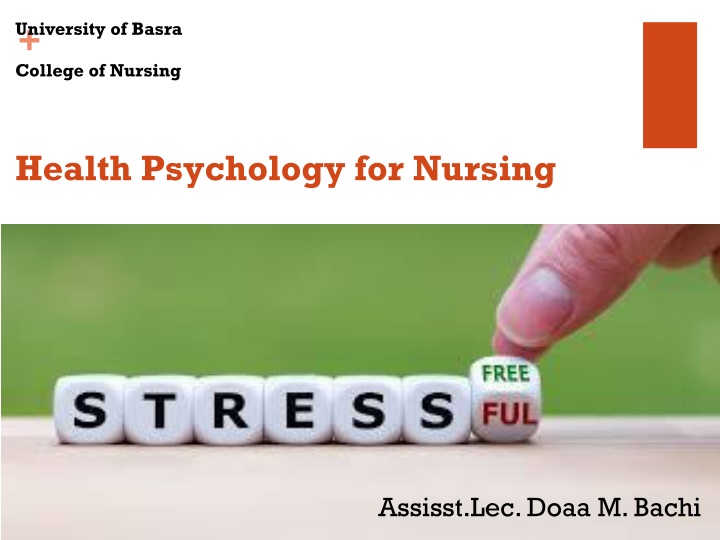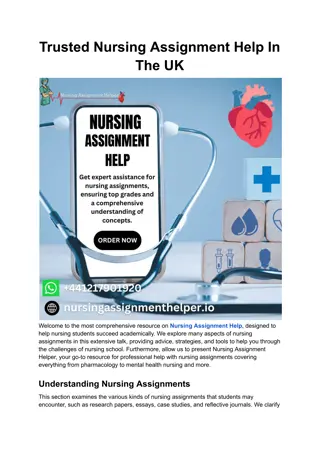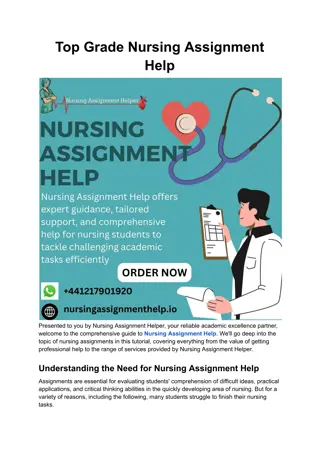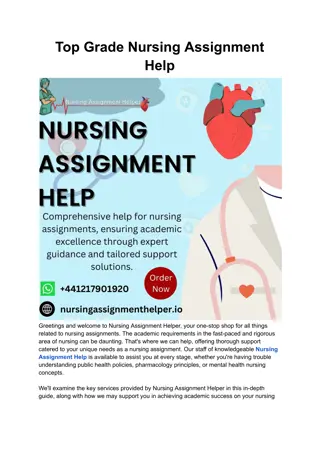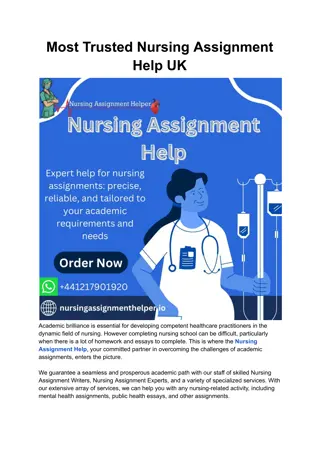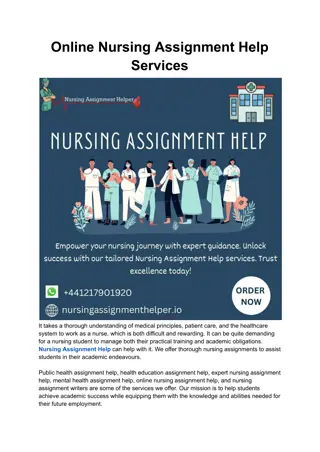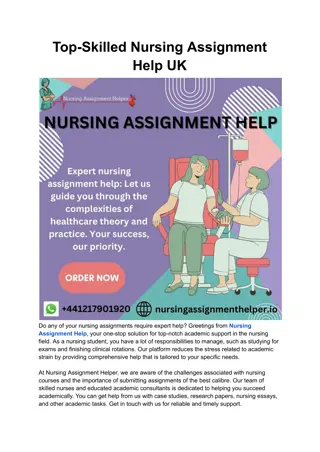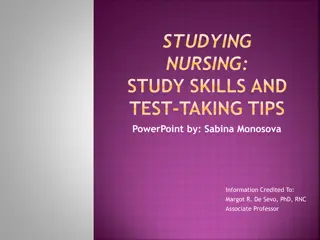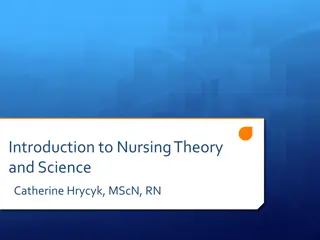Health Psychology for Nursing
Stress is a state of mental tension and worry caused by various problems in life or work, leading to strong feelings of anxiety. Stressors are stimuli or sources that lead to stress, which can be internal (fear, guilt) or external (trauma, peer pressure). These stressors can be physiological, psychological, or from events seen on TV. The central nervous system plays a crucial role in the body's fight or flight response to stress, triggering the release of stress hormones like adrenaline and cortisol.
Download Presentation

Please find below an Image/Link to download the presentation.
The content on the website is provided AS IS for your information and personal use only. It may not be sold, licensed, or shared on other websites without obtaining consent from the author.If you encounter any issues during the download, it is possible that the publisher has removed the file from their server.
You are allowed to download the files provided on this website for personal or commercial use, subject to the condition that they are used lawfully. All files are the property of their respective owners.
The content on the website is provided AS IS for your information and personal use only. It may not be sold, licensed, or shared on other websites without obtaining consent from the author.
E N D
Presentation Transcript
University of Basra + College of Nursing Health Psychology for Nursing Assisst.Lec. Doaa M. Bachi
+ http://www.globalhealingcenter.com/media/stress-cartoon.jpg Let s define it! In your own words, write down a definition of stress.
+ a state of mental tension and worry caused by problems in your life, work, something that causes strong feelings of worry or etc anxiety
+Identifying Stressors The sources or stimuli for stress are called stressors. Stressor precipitating a change. It may be internal (fear, guilt) or external (trauma, peer pressure, etc) is the stimuli proceeding or Situations, activities, and relationships that cause trauma to one s physical, emotional, or psychological self
+ Types of stressors 1. Physiological stressors a. Chemical agents b. Physical agents Illness, injuries, hormonal fluctuations, inadequate sleep or nutrition c. Infectious agent d. Nutrition imbalances e. Genetic or immune disorders
+ 2. Psychological Stressors Accidents can cause stress for the victim, the person who caused the accident and the families of both Stressful experiences of family members and friends Fear of aggression or mutilation from others such as murder, rape, terrorist and attacks.
+ Events that we see on T.V. such as war, earthquake, violence Developmental and life events Rapid changes in our world, including economic and political structures and technology
+ Your central nervous system (CNS) is in charge of your fight or flight response. In your brain, the hypothalamus gets the ball rolling, telling your adrenal glands to release the stress hormones adrenaline and cortisol. These hormones rev up your heartbeat and send blood rushing to the areas that need it most in an emergency, such as your muscles, heart, and other important organs. When the perceived fear is gone, the hypothalamus should tell all systems to go back to normal. If the CNS fails to return to normal, or if the stressor doesn t go away, the response will continue.
+ Types of Stress 1. Eustress The optimal amount of stress, whichhelps to promote health and growth.e.g.: praise from a superior for hardworking. 2. Distress Stress due to an excess of adaptive demands placed upon us. The demands are so great that they lead to bodily and mental damage. e.g.: unexpected death of a loved one.
+ It s our body's immediate reaction to a new challenge, event, or demand, and it triggers your fight- or-flight responses. Example: pressures of a near-miss automobile accident or arguments with family 4. Episodic acute stress 3. Acute stress When acute stress happens frequently, it s called episodic acute stress. They commonly have a negative outlook or worry about everything. They think of stress as part of their lives and have difficulties changing their lifestyles 5. Chronic stress If acute stress isn't resolved and begins to increase or lasts for long periods of time, it becomes chronic stress. This stress is constant and doesn t go away.
+ Sources of Stress 1. Internal Stressors they originate within a person e.g.: cancer, feeling of depression 2. External stressors it originates outside the individual e.g.: moving to another city, death in a family.
+ 3. Developmental stressors it occurs at predictable times throughout an individual s life. e.g.: child- beginning of school. 4. Situational stressors they are unpredictable and occur at any time during life. It may be positive or negative. e.g.: death of family member, marriage/ divorce.
+ Signs of Stress Physical, Emotional & Behavioral Racing Heart Shaky Hands/Legs High Blood Pressure Headaches PHYSICAL Tenseness Muscle Spasms Indigestion
+ Signs of Stress Physical, Emotional & Behavioral Anxiety Fear Irritability Impatience EMOTIONAL Depression Inability to Focus Guilt
+ Signs of Stress Physical, Emotional & Behavioral Change in Appetite Difficulty Sleeping Forgetfulness Social Withdrawal/Avoidance BEHAVIORAL Increased use of Caffeine and Other Substances Loss of Concentration Mood Swings
+ Can stress be positive? oStress can motivate you to meet your goals. The stress of a deadline can motivate you to finish the assignment. o A fire alarm can cause stress that alerts you to avoid danger. o Planning a vacation. o Getting promoted at work.
+ Coping Strategies Be realistic: Set limits. Say no to extra responsibility or activities if feeling overwhelmed. Stop being a superhero: No one is perfect so don't expect that from yourself or others. Take one thing at a time: When feeling overwhelmed by many tasks, pick one urgent task. Complete one task before moving onto another. Share feelings: Stay in touch with people! Friends can provide a sounding board, show support and provide guidance.
+ Ways to Manage Stress Exercise Eat Healthy Practicing Positive Self-Talk Limit Negative People in Your Life Time Management Get Enough Sleep Meditation Art Therapy (Sketching, Journaling, Coloring, etc) Ask for help. Breathing Exercise.
